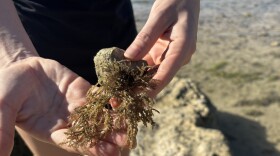A majority of Hawaii visitors are aware of the impact of sunscreen chemicals on coral, but there’s still work that needs to be done. That’s according to a new survey from the National Oceanic and Atmospheric Administration.
The state approved a ban on oxybenzone and octinoxate last year. Both chemicals are widely used in sunscreen, and have been found to be toxic to corals. The ban will go into effect in 2021.
To gauge educational efforts on the state’s ban, NOAA researchers asked beach goers at two popular beaches on Oahu and Hawaii Island about their awareness of the chemicals on coral reefs.
“We found that people were surprisingly aware of the effects of sunscreen,” said Arielle Levine, the study lead. “It’s really been prevalent in the news, and people are learning about it when they are researching their trips to Hawaii.”
Levine says about 75% of the people surveyed said they were aware of certain chemicals being harmful to corals. Researchers found that around 92% of Hawaii residents were aware of the effects of oxybenzone and octinoxate on coral. 75% of surveyed visitors from the U.S. mainland said they were aware, and around 63% of international visitors told researchers they heard of these issues.
"I actually didn't expect a lot of people to be aware of [the effects of certain chemicals on coral]," said Levine. "It's kind of a niche issue, if you live somewhere where there is no coral -- there's no reason for you to be concerned about it.
"But the fact that people are coming here, and want to go in the water, and want to learn about what's going on in Hawaii -- people are learning about it."
Researchers also asked residents and visitors about the kinds of sunscreens they used, where they purchased it, and why they chose the sunscreen they purchased. They found that half of those surveyed said they bought their sunscreen in the state, which means the ban will only affect 50% of the sunscreens used in the state.
But there were still some misunderstandings about the state's ban.
"A lot of people told me that they waited to purchase their sunscreen until they got here because they knew if they got to Hawaii, whatever they bought here would be safe because of the ban," said Levine. "But they were trying to do the right thing, which is very encouraging."
The study also found that the most common thing beach goers looked for in a sunscreen was the SPF. Approximately 42% of people surveyed told researchers that was the reason they purchased a sunscreen. While a quarter of participants said they purchased a sunscreen because it wasn't toxic for the environment.
Levine hopes the study can be used to further educate residents and visitors about the state’s ban.




